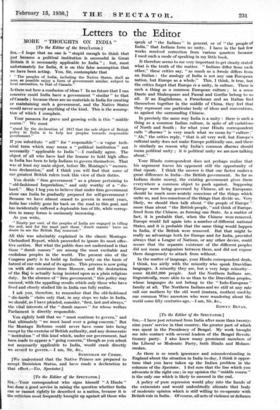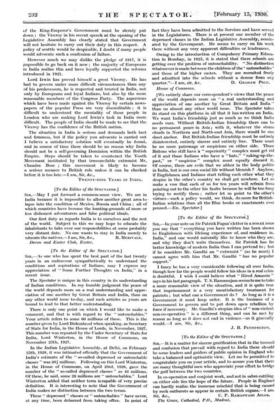[To the Editor of the SPECTATOR.] SIR,—I have just returned
from India after more than twenty- nine years' service in that country, the greater part of which was spent in the Presidency of Bengal. My work brought me into contact with several leaders of the Bengal Revolu- tionary party. I also knew many prominent members of the Liberal or Moderate Party, both Hindu and Moham- medan.
As there is so much ignorance and misunderstanding in England about the situation in India to-day, I think it oppor- tune that you have taken up the Indian problem in the columns of the Spectator. I feel sure that the line which you advocate is the right one ; in my opinion the "middle course " is the only one which is likely to succeed in the end.
A policy of pure repression would play into the hands of the extremists and would undoubtedly alienate that body of moderate opinion which is still willing to co-operate with British rule in India. Of course, all acts of violence or defiance
of the King-Emperor's Government must be sternly prit down ; the Viceroy in his recent speech at the opening of the- Legislative Assembly has clearly stated that Government will not hesitate to carry out their duty in this respect. A policy of scuttle would be despicable, I doubt if many people would advocate such a confession of failure.
However much we may dislike the pledge of 1917, it is impossible to go back on it now ; the majority of Europeans in India realize this and have loyally supported the reforms introduced in 1921.
Lord Irwin has proved himself a great Viceroy. He has bad to govern under more difficult circumstances than any of his predecessors, he is respected and trusted in India, not only by Europeans and loyal Indians, but also by the more reasonable members of the Congress Party. The aspersions which have been made against the Viceroy by certain news- papers of the popular Press are very discreditable ; it is difficult to understand the mentality of those people in London who are making Lord Irwin's task in India more difficult. The people of India should be made to see that the Viceroy has the confidence of the British nation.
The situation in India is serious and demands both tact and firmness, but if the policy you advocate is carried out I believe a satisfactory solution will eventually be found, and in course of time there should be no reason why India should not be a self-governing Dominion within the British Empire. Steps should be taken to counteract the Youth Movement instituted by that irreconcilable extremist Mr. Chandra Bose ; this movement is likely to become a serious menace to British rule unless it can be checked before it is too late.—I am, Sir, &c., TWENTY-NINE YEARS IN INDIA.











































 Previous page
Previous page